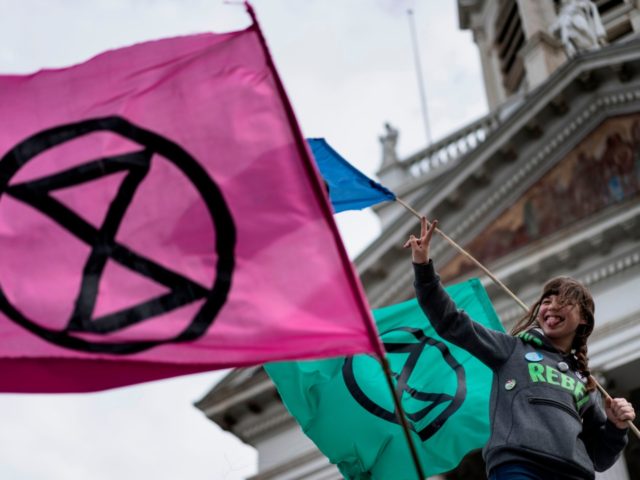Activists from the Extinction Rebellion (XR) environmental group have threatened inevitable “mass death” by climate change as they begin their fourth day of a week-long hunger strike.
On Monday, hunger strikers occupied the office of Speaker of the House Nancy Pelosi calling for more decisive action on the part of the Democrats to tackle the “climate crisis.” Activists complained that Pelosi had refused to participate in a filmed interview with movement members.
Instead, Ms. Pelosi issued a statement saying she was “inspired” by young climate activists and insisting that the Democrats were “working relentlessly to safeguard our environment and ensure a healthy, sustainable world for our children.”
Hunger strikers with @ExtinctionR have occupied @SpeakerPelosi office for Day 2 of the #GlobalHungerStrike. Scientists see mass death as inevitable unless action is taken now. One party denies the science; the other has failed to respond to it with the urgency the crisis demands pic.twitter.com/vhutaaRPCp
— Extinction Rebellion Washington DC (@XRebelDC) November 19, 2019
The strikes, which began Monday, have been in organized in 27 countries, led by 20-year-old Giovanni Tamacas of the University of San Diego.
“We are hunger striking because we have no choice,” Tamacas said in a statement, arguing that governments and corporations “have criminally and catastrophically failed to tackle the climate and ecological emergency.”
Last month, a spokesperson for Extinction Rebellion (XR) confessed that the group makes unsubstantiated predictions of mass deaths because “alarmist language works.”
Pressed by Andrew Neil of the BBC, XR spokesperson Zion Lights acknowledged there is no scientific basis for predictions of mass deaths from climate change, but contended that such incendiary language is necessary to motivate people.
“I’ve seen some of your activists claim on TV that billions of people are going to die in quite short order. One of your founders, Roger Hallam, said in April, ‘Our children are going to die in the next ten or twenty years.’ What’s the scientific basis for these claims?” Neil asked.
“So, these claims have been disputed, admittedly,” Ms. Lights replied. “There are some scientists agreeing and some scientists saying they’re simply not true but the overall issue is that these deaths are going to happen. We don’t know exact numbers and actually it’s a little bit concerning to focus on just how many deaths. There will be deaths and suffering and any amount is enough as far as we are concerned.”
But billions of people dying, “I don’t know where the scientific validity comes for that. How would they die?” Neil pressed.
“Mass migration around the world already taking place due to prolonged drought in countries, particularly in South Asia, wildfires in Indonesia, the Amazon rain forest, Siberia, you know, the arctic…” Lights said.
“You talk weather-related disasters. There seem to be a lot of them around at the moment and people die from them,” Neil said.
“But in the latest figures I’ve seen, 100 years ago weather-related disasters killed half a million people a year. Today’s it’s 20,000 a year. It’s still 20,000 too many but it’s a reduction of 95 percent. It does not lead to the death of billions,” he said.
“You’re scaring people with this rhetoric, aren’t you?” he pressed.
“I think there’s a danger of scaring people simply because we’re not taking it seriously enough and people are feeling really desperate that we’re heard on this and unfortunately, alarmist language works,” Lights said.
“We’re using language that we feel is appropriate to the situation,” she added.

COMMENTS
Please let us know if you're having issues with commenting.